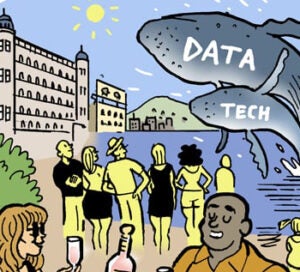When WhatsApp began serving ads in mid-June, there were two main reactions.
One, didn’t the founders always insist there would never be ads on WhatsApp?
And two, what the heck took Meta so long?
It was only inevitable that Meta would roll out ads in an app that now has more than 3 billion monthly active users.
And on Tuesday, Meta made another series of WhatsApp-related announcements at Conversations, its annual messaging-focused conference, including the ability for businesses to manage ads for WhatsApp, Instagram and Facebook from one place in Ads Manager and use AI to optimize budgets across the family of apps.
Status update
But why introduce ads now, more than a decade after Facebook bought WhatsApp?
“We’ve talked for a while about how we want to build a business that doesn’t interrupt a person’s core WhatsApp experience,” Nikila Srinivasan, Meta’s VP of product management for business messaging, told AdExchanger in Cannes.
“And this felt like a good time, because we were seeing Channels and Status being used in really creative ways by admins and businesses,” she said.
Channels is a feature within WhatsApp that lets brands and creators share updates with users in a one-way broadcast-like feed. Status is WhatsApp’s answer to Stories, where users can share photos, videos and text updates that automatically disappear after 24 hours.
Both Channels and Status are housed within a dedicated Updates tab. Roughly 1.5 billion people open and engage with the Updates tab every day.
The new ads on WhatsApp appear within the Status feed and operate a bit like click-to-message ads on Facebook and Instagram, with a twist. Instead of opening the Messenger chat app when someone taps, the ads prompt people to start chatting with a business directly inside of WhatsApp.
“Businesses can start a chat with people right then and there,” Srinivasan said. “It’s a way for businesses to grow their user bases and for users to discover new businesses.”
But Srinivasan was quick to point out that ads don’t appear within personal chats or group conversations on WhatsApp.
“People only see these ads if they seek out the experience,” she said. “If you only want to use WhatsApp to chat with friends, family and the businesses you choose to hear from, that won’t change.”
No Ads!
WhatsApp has also been careful to emphasize that introducing ads won’t alter its approach to privacy and encryption.
Advertisers will only be able to target based on basic signals, including location, device language and the channels a person follows. Meta says it won’t use any PII from WhatsApp to target ads, such as phone numbers, messages or the content of calls.
But that hasn’t stopped privacy advocates from issuing a warning that even WhatsApp’s relatively limited data collection for ad targeting could erode user privacy over time because it sets a precedent for broader data use.
“It’s important to reiterate that privacy has and will continue to be at the core of how we operate at WhatsApp,” Srinivasan said. “It’s the central philosophy for how we build.”
Perhaps.
But advertising wasn’t central to the philosophy of WhatsApp co-founders Jan Koum and Brian Acton.
To be fair, both are long gone. Acton left Facebook in 2017 and Koum departed the following year. Their position was quite clear, though. Koum famously kept a Post-it note taped to his desk for years on which Acton had scribbled the words: “No Ads! No Games! No Gimmicks!”
That Post-it note was cited in many of the news stories covering the release of WhatsApp ads as evidence of Meta breaking its “no ads” promise.
But that was a long time ago, Srinivasan said.
“It’s been more than a decade and a half since then, and not only has WhatsApp evolved, what people want from WhatsApp has evolved,” she said. “We think of this as an evolution of what this product can do for people and for businesses.”

















